Spousal Sponsorship in Canada
The Ultimate Guide to Spousal Sponsorship in Canada
Welcome to your one-stop place for everything you need to know about Spousal Sponsorship in Canada! Whether you’re starting your application or navigating tricky situations, if you are looking to sponsor your spouse, this guide is here to break it all down in a way that’s engaging, informative, and totally actionable.
What is Spousal Sponsorship?
Let’s start with the basics: Spousal Sponsorship is a Canadian immigration program that allows citizens and permanent residents to sponsor their spouse, common-law partner, or conjugal partner to live with them in Canada as a permanent resident.
Why Does Canada Have This Program?
Canada values family reunification. Spousal sponsorship ensures loved ones can live together and build their lives in Canada without prolonged separation.
Key Benefits
Let me tell you why spousal sponsorship is a game-changer for families:
- Permanent Residency: This is the big one. Once your partner’s application is approved, they become a permanent resident of Canada. That means they’ll enjoy the same rights and privileges as any other permanent resident—the ability to work, study, and access healthcare. Imagine the peace of mind knowing your loved one has stability and opportunity here in Canada.
- Fast Processing: Good news! Spousal sponsorship applications are prioritized. Unlike other family-class applications, the government understands how important it is to keep families together. So, you won’t be left in limbo for too long. Most applications are processed in 12 to 18 months for inland cases and even faster for outland applications. This means less waiting and more time building your life together.
- Flexibility: Whether your partner is already in Canada or still abroad, this program has got you covered. Inland sponsorship is perfect for those who are already living together in Canada, while outland sponsorship allows for international applications. You can pick the route that works best for your situation. Plus, inland applicants can apply for an open work permit is a huge bonus if your spouse wants to start working right away.
Fun Fact: Did you know that over 60,000 people are granted permanent residency through spousal sponsorship every year? That’s a lot of families reunited and dreams coming true. Your story could be next on this list!
Eligibility Requirements
Who Can Sponsor?
To sponsor your spouse, you must:
- Be a Canadian citizen, permanent resident, or registered under the Canadian Indian Act.
- Be at least 18 years old.
- Demonstrate financial ability to support your spouse without relying on social assistance.
- Not be bankrupt, under a removal order, or in prison.
Pro Tip: If you’re a permanent resident, you must reside in Canada to sponsor your spouse.
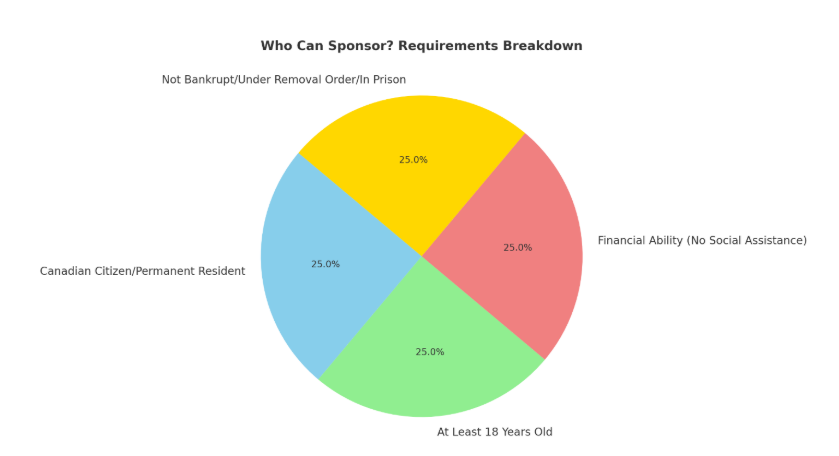
Who Can Be Sponsored?

Let’s dive into who qualifies as your partner under Canada’s spousal sponsorship program. These categories are designed not only to ensure fairness but also to align with Canada’s broader immigration goals of fostering family reunification while maintaining the integrity of the system. By setting clear criteria, the government aims to prioritize genuine relationships and discourage misuse of the sponsorship process. This isn’t just about love; it’s about meeting the government’s requirements. Your partner must fit into one of these categories:
1. Spouse
Your spouse is someone you are legally married to. This means you have a marriage certificate from a recognized authority in the country where the marriage took place. Even if you married abroad, Canada will recognize your marriage as long as it’s legally valid in that country.
Example: Emily and James got married in Italy and have a legal Italian marriage certificate. Their marriage is recognized under Canadian law, making James eligible for spousal sponsorship.
2. Common-law Partner
A common-law partner is someone you’ve lived with in a marriage-like relationship for at least 12 consecutive months. This doesn’t mean 11 months and 29 days—it has to be a full year of cohabitation. You’ll need to provide evidence like joint leases, shared bills, or affidavits from people who can confirm your relationship.
Example: Priya and Ahmed have lived together in Toronto for 14 months. They share a rental agreement and have a joint bank account. This makes Ahmed eligible as a common-law partner.
3. Conjugal Partner
This category is for couples who are unable to live together or marry due to extraordinary circumstances, such as cultural or legal barriers. You’ll need to prove that your relationship is genuine and ongoing, despite these challenges.
Example: Fatima and Alex are in a long-distance relationship. Due to strict laws in Fatima’s home country, they can’t marry or live together. However, they’ve maintained a committed relationship, with evidence like travel records, financial support, and communication logs. Fatima qualifies as a conjugal partner.
Eligibility Red Flags for Spousal Sponsorship to Canada
Now, let’s talk about potential hurdles. Even if your partner fits into one of the above categories, certain issues could jeopardize their eligibility:
Previous Sponsorship Bans
If you’ve sponsored someone else as a spouse, common-law, or conjugal partner within the last five years, you’re barred from sponsoring again. This rule is in place to prevent misuse of the sponsorship program.
Example: Sarah sponsored her first husband in 2020, but they divorced in 2022. She must wait until 2025 to sponsor her new spouse, Liam.
Incomplete or Misleading Relationship Evidence
IRCC scrutinizes applications for authenticity. If you fail to provide sufficient proof of your relationship or submit misleading information, your application could be rejected. Common mistakes include submitting unclear or inconsistent evidence, such as mismatched timelines or incomplete financial records. For example, a couple might provide photos from the same event but fail to include travel itineraries or receipts to corroborate their story. Another frequent pitfall is relying solely on personal declarations without external documentation, like affidavits from family or joint account statements. To avoid rejection, ensure your evidence paints a clear, cohesive picture of your relationship from multiple angles.
Example: John and Maria submitted only a few photos together and no proof of shared finances. IRCC flagged their application for insufficient evidence. To avoid this, include a variety of supporting documents like travel itineraries, joint bank statements, and letters from family and friends.
Key Takeaway: Whether you’re married, in a common-law partnership, or facing unique circumstances as a conjugal partner, it’s all about the evidence. The more genuine and comprehensive your documentation, the smoother your application process will be. Effective documentation includes a mix of photos from different occasions, joint financial accounts like shared bank statements, communication logs to show consistent contact, and affidavits from family or friends who can vouch for your relationship. For example, submitting a variety of evidence such as wedding photos, travel receipts, and a lease agreement with both names significantly increases your application’s success rate. These pieces of evidence collectively paint a vivid and authentic picture of your relationship, making it easier for IRCC to approve your application without delays.
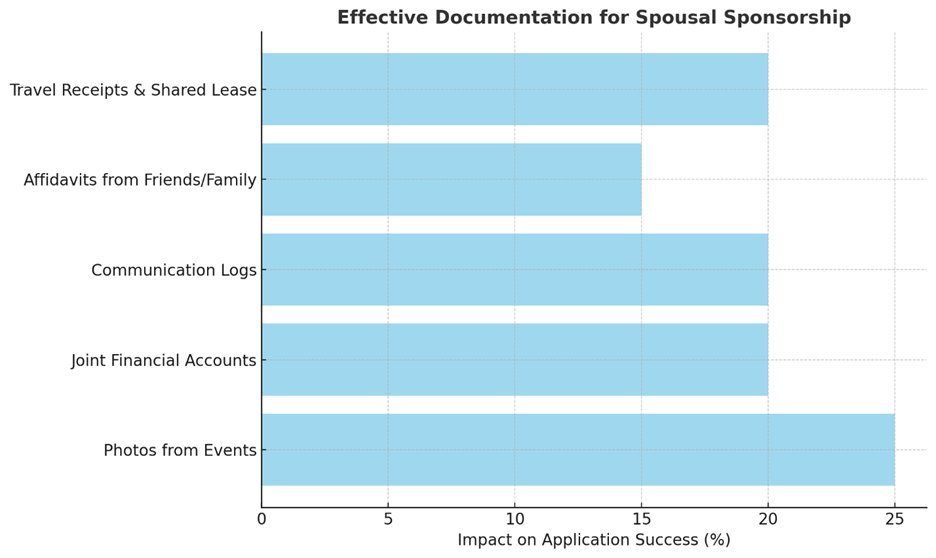
Types of Sponsorship Applications
Inland Sponsorship
- Your spouse lives in Canada with you.
- Eligible for an Open Work Permit while waiting for PR processing.
- Allows applicants to remain in Canada during the process.
Outland Sponsorship
- Your spouse lives outside Canada.
- Application is processed through the visa office serving their country of residence.
- Suitable for partners who wish to travel internationally during processing.
Comparison Chart: Inland vs. Outland Sponsorship
| Criteria | Inland Sponsorship | Outland Sponsorship |
| Applicant Location | Inside Canada | Outside Canada |
| Work Permit Option | Open Work Permit Available | Not Available |
| Processing Times | May take longer | Often faster |
| Travel Restrictions | Must remain in Canada | Can travel internationally |
Note: Choosing the right application type depends on your partner’s location and travel plans.
How am I affected by the changes in the Spousal Sponsorship Application?
Spousal Application Process
Step-by-Step Guide
- Check Eligibility: Ensure you and your spouse meet the requirements.
- Complete the Application Package: Download the forms from the IRCC website.
- Gather Supporting Documents: See the checklist below.
- Pay the Fees: Sponsorship fee, PR fee, and biometrics fee.
- Submit the Application: Online or by mail.
- Provide Biometrics: Your spouse will need to submit fingerprints and a photo.
- Wait for Approval: IRCC will process your application and provide updates.
- Decision Notification: Receive confirmation of approval or a request for further information.
Effective Documentation for Spousal Sponsorship
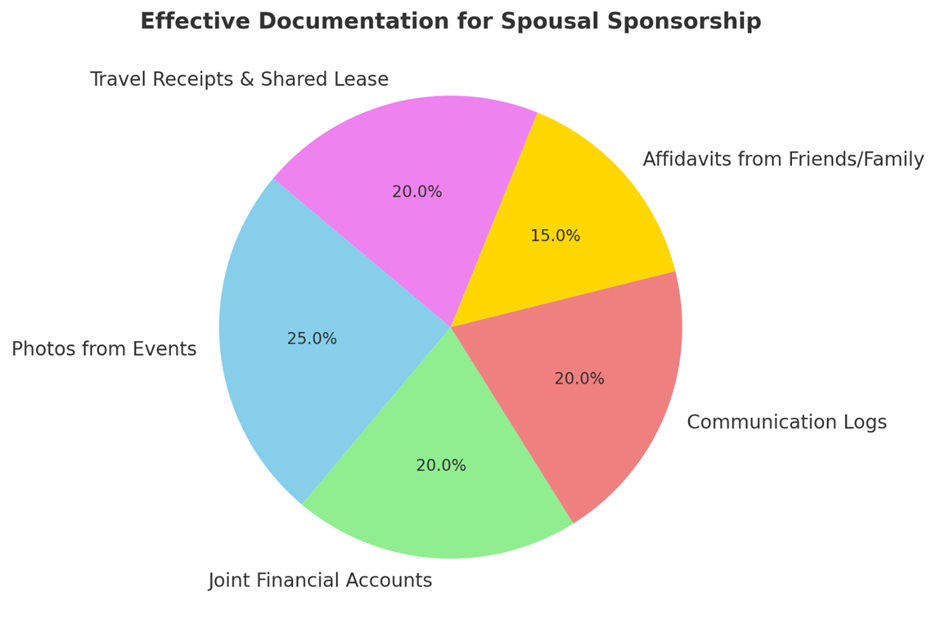
Effective Documentation for Spousal Sponsorship
For the Sponsor
- Proof of Canadian Citizenship or Permanent Residency
- What it is: A document showing your legal status in Canada.
- Examples: Passport, citizenship certificate, PR card, or Canadian birth certificate.
- Why it matters: IRCC needs to confirm that you’re eligible to sponsor someone under Canadian immigration law.
Example: If you’re a permanent resident, include a clear copy of both sides of your PR card. If you’re a citizen, a scanned copy of your Canadian passport or citizenship certificate will suffice.
- Proof of Income
- What it is: Documents showing you can financially support your spouse.
- Examples: Pay stubs, Notice of Assessment from the CRA (most recent tax year), employment letters, or bank statements.
- Why it matters: While there’s no strict income threshold for spousal sponsorship, IRCC wants to ensure you can meet basic living expenses without government assistance.
Example: Submit 6 months of pay stubs along with a letter from your employer confirming your salary and job stability.
- Signed Sponsorship Agreement
- What it is: A formal agreement between you and your spouse outlining your responsibilities during the sponsorship period.
- Why it matters: It’s a legal promise to financially support your spouse for three years after they become a PR.
Example: Include the completed IMM 1344 form signed by both you and your spouse. This agreement is a key part of your application.
- Declaration of Intent to Reside in Canada (if applicable)
- What it is: A statement confirming your intent to live in Canada once your spouse becomes a PR (for sponsors
currently living abroad). - Examples: A written letter, job offer in Canada, or proof of a Canadian address.
- Why it matters: IRCC requires proof that you’ll be in Canada to fulfill your sponsorship obligations.
- What it is: A statement confirming your intent to live in Canada once your spouse becomes a PR (for sponsors
Example: A Canadian citizen living in the UK might include a job offer letter from a Canadian company or proof of a home purchase in Canada.
For the Applicant
- Passport or Travel Document
- What it is: A valid, government-issued identification document.
- Examples: Current passport, national ID with travel privileges.
- Why it matters: IRCC needs proof of identity and citizenship for the applicant.
Example: Include a copy of the biodata page of your passport. If your passport is about to expire, renew it before applying.
- Marriage Certificate or Proof of Common-Law Relationship
- What it is: Evidence of your legal or de facto relationship.
- Examples: Marriage certificate, shared utility bills, joint lease agreements, or affidavits from family and
friends. - Why it matters: IRCC must confirm the legitimacy of your relationship.
Example: Submit your marriage certificate if legally married or a combination of joint financial documents if you’re common-law.
- Police Certificates for All Countries of Residence Since Age 18
- What it is: Criminal background checks for every country you’ve lived in for 6+ months.
- Examples: Police clearance certificates or background check reports from local authorities.
- Why it matters: IRCC uses this to assess admissibility to Canada.
Example: If you lived in the US for 2 years, provide an FBI clearance report along with the RCMP clearance for Canada.
- Medical Exam Results from an IRCC-Approved Physician
- What it is: A medical assessment confirming you meet Canada’s health standards.
- Examples: Completed medical report form (IMM 1017E) issued by an IRCC-approved panel physician.
- Why it matters: Ensures you’re not inadmissible due to medical issues.
Example: Schedule your medical exam with an IRCC-recognized doctor and include the receipt or confirmation from the clinic.
- Proof of Prior Relationships Ending (if applicable)
- What it is: Documentation showing any previous marriages or partnerships have legally ended.
- Examples: Divorce decrees, annulment papers, or death certificates.
- Why it matters: IRCC needs to confirm there are no legal obstacles to your current relationship.
Example: If previously married, include a certified copy of your divorce decree.
Tips for Organizing Your Documents
- Keep it Clear and Logical: Organize documents by category (e.g., sponsor vs. applicant) and label them clearly.
- Use IRCC’s Checklist: Cross-check against the official document checklist to ensure you don’t miss anything.
- Provide Translations: If any documents are in a language other than English or French, include certified translations.
By preparing your documents thoroughly and presenting them in a logical order, you can avoid delays and strengthen your application!
Flowchart: Document Submission Process
Document Checklist Flowchart for Spousal Sponsorship
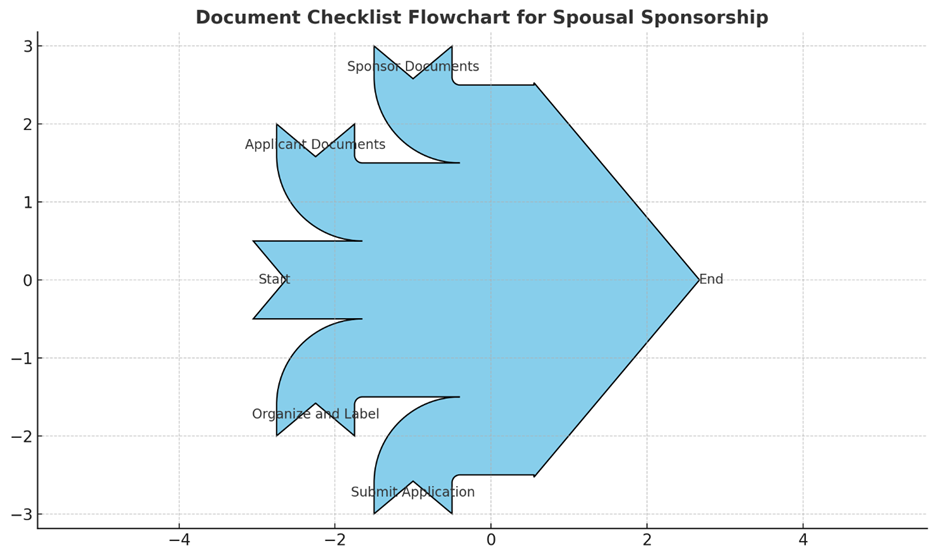
Flowchart for Spousal Sponsorship
Proof of Relationship
IRCC will scrutinize your relationship to ensure it’s genuine. Here’s how to prove it:
- Photos Together: Include pictures from different occasions, places, and with family/friends.
- Joint Accounts: Bank statements showing shared accounts or co-signed loans.
- Communication: Emails, text messages, or call logs showing regular contact.
- Affidavits: Letters from family and friends attesting to your relationship.
Sample Evidence Timeline
| Type of Evidence | Examples | When to Provide |
| Communication | Emails, chats, call logs | Throughout relationship |
| Financial Interdependence | Joint accounts, shared expenses | During cohabitation |
| Milestones | Wedding photos, travel itineraries | Significant events |
Spousal Sponsorship Reducing the Backlog
As the large number of applications began to pile up in the immigration office, the government of Canada decided to take some necessary measures to reduce it. This backlog was not only causing delays to existing applications but was also debilitating the government’s capacity to attract potential new applicants. Along with many other immigration programs, the Spousal Sponsorship Program also saw important changes. Generally, the assessment process became more stringent and only after a long and thorough scrutiny process do the applications reach a decision. This takes a lot of time.
Processing Times for Spousal Sponsorship Application
Processing times for spousal sponsorship applications are a crucial factor for applicants and sponsors alike. The duration can vary widely based on multiple factors, and understanding these canhelp you plan better and avoid unnecessary delays.
Factors That Influence Processing Times
- Application Type (Inland vs. Outland):
- Inland Sponsorship: This process typically takes 12-18 months. It involves applicants already living in Canada with their sponsor. Inland applicants may be eligible for an Open Work Permit, allowing them to work while waiting for their application to be processed. However, inland applications might take longer due to additional checks and potential work permit issuance.
- Outland Sponsorship: This process generally takes 9-12 months. It’s suitable for applicants living outside Canada or those who wish to travel during the application process. Applications are processed by the visa office in the applicant’s home country or region, which can sometimes result in faster decisions.
- Country of Residence:
- Applications processed in countries with efficient visa offices may be faster than others. For instance, applicants from countries with strong diplomatic ties to Canada might experience smoother processing compared to those from regions with higher caseloads or limited resources.
- Completeness of Application:
- Missing documents, errors in forms, or insufficient proof of relationship can lead to delays. Submitting a thorough, well-organized application significantly reduces the risk of IRCC requesting additional documents, which can extend processing times by months.
Why Are Processing Times Important?
Knowing the estimated timeframes allows you to plan your personal and professional life better. For example:
- Inland Applicants: Can arrange temporary housing, secure jobs with an Open Work Permit, and adjust family schedules accordingly.
- Outland Applicants: Can make travel plans, prepare financially for the move, and ensure they have all required documents ready.
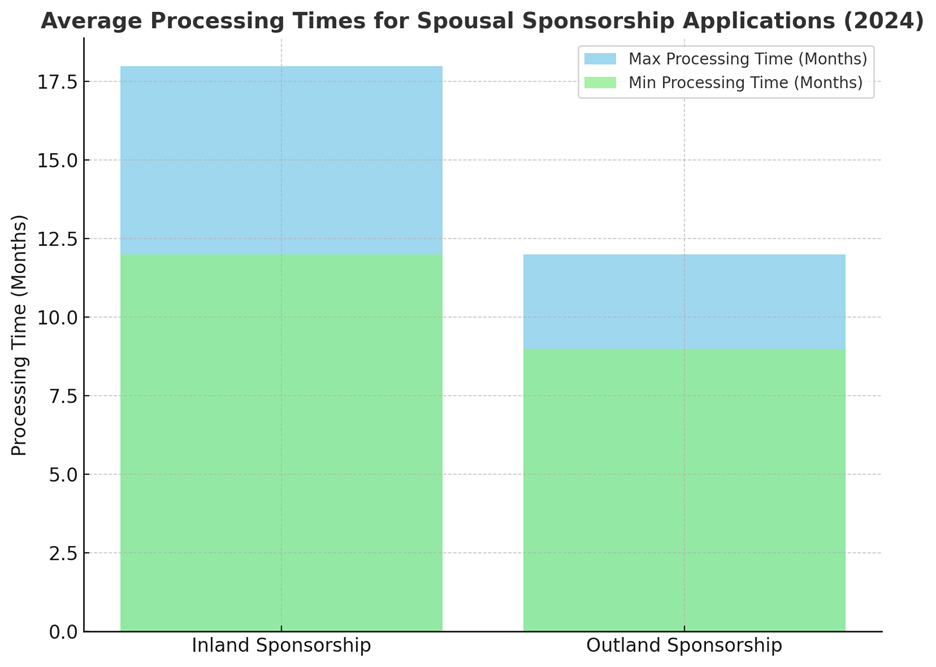
Processing Times for Spousal Sponsorship Application
Challenges and Solutions in Spousal Sponsorship Applications
When it comes to spousal sponsorship, challenges can arise that might seem overwhelming. Trust me, you’re not alone in this! Many applicants face roadblocks along the way, but the good news is that most issues can be tackled with the right approach. Let’s dive into the common challenges you might face and how to overcome them like a pro.
Common Challenges
- Incomplete Documentation: The Silent Application Killer
Missing or incorrect documents are one of the most common reasons for delays and rejections. Think of your application as a puzzle—every piece must fit perfectly. Forgetting a single document, like a police certificate or a signed form, can derail the entire process.
Example:
Let’s say you forgot to include proof of relationship, like a joint lease agreement. Without it, IRCC might question the authenticity of your relationship, leading to delays or even a refusal.
- Inadmissibility: Medical or Criminal Issues
Inadmissibility can feel like a brick wall, but it’s not the end of the road. Whether it’s a past criminal record or a health condition, these issues require additional steps to resolve.
Example:
Imagine your spouse has a minor criminal record from 10 years ago. This could make them inadmissible to Canada. However, applying for Criminal Rehabilitation can resolve the issue permanently.
- Delays in Processing: The Waiting Game
Processing delays are often caused by errors, missing biometrics, or high application volumes. Waiting can be frustrating, especially when every day apart feels like an eternity.
Example: If IRCC requests additional documents and you delay submitting them, this can extend the processing time by months. Even something simple, like missing a biometrics appointment, can set you back significantly.
Solutions: Turn Challenges into Triumphs
- Use a Detailed Checklist: Your Secret Weapon
A checklist isn’t just a piece of paper; it’s your lifeline. Go through it meticulously, item by item, to ensure nothing is missed. Double-check your forms, ensure all signatures are in place, and verify your evidence before submitting.
Pro Tip:
Create a folder on your computer to organize scanned documents by category (e.g., “Proof of Relationship,” “Sponsor Documents”). This way, you can cross-reference everything before hitting submit.
- Address Inadmissibility Head-On
If medical or criminal inadmissibility is a concern, act proactively. For medical issues, ensure your spouse completes the medical exam with an IRCC-approved panel physician. For criminal records, consider a Temporary Resident Permit (TRP) for immediate entry or Criminal Rehabilitation for a long-term solution.
Example: If your spouse has a past conviction, start the Criminal Rehabilitation process early. Include all necessary documents, like court records and proof of rehabilitation efforts, to strengthen the case.
- Follow Up with IRCC Like a Pro
Keeping track of your application status is crucial. Use IRCC’s online tools to monitor progress and respond promptly to any requests. If you experience delays, don’t hesitate to contact IRCC for updates or seek help from an immigration consultant.
Pro Tip: Set calendar reminders to check for updates regularly and ensure you meet deadlines for additional documentation requests.
Why Challenges Are Opportunities
Every challenge is an opportunity to showcase your diligence and commitment. For instance:
- Addressing inadmissibility demonstrates your seriousness about becoming a part of Canada.
- Providing a complete, well-organized application shows you’re prepared and detail-oriented.
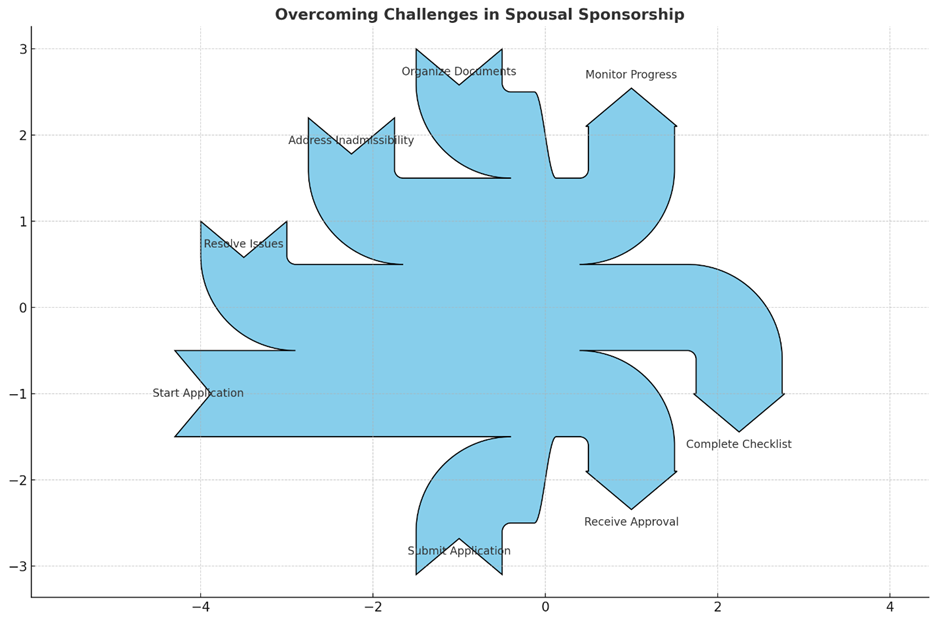
Challenges and Solutions in Spousal Sponsorship
The TakeawaySpousal sponsorship may feel like navigating a maze, but with the right preparation and mindset, you’ll find your way through. By staying organized, addressing challenges head-on, and staying proactive, you’ll not only minimize delays but also strengthen your case. Remember, every hurdle you overcome brings you one step closer to reuniting with your loved one in Canada. Let’s tackle this journey together!
Tips for a Successful Application
- Be Honest: Never provide false information.
- Stay Organized: Keep all documents in a clear, logical order.
- Monitor Application Status: Use IRCC’s online portal.
- Seek Expert Help: Consider hiring an immigration consultant for complex cases.
Additional Topics for Spousal Sponsorship: Procedural Fairness Letters
A Procedural Fairness Letter (PFL) is IRCC’s way of saying, “Hey, something’s not adding up, and we need you to explain yourself.” Don’t panic—this is your chance to address their concerns and keep your application on track.
What Triggers a Procedural Fairness Letter?
- Relationship Red Flags
IRCC carefully scrutinizes relationships to ensure they are genuine. Here are specific red flags that could lead to a PFL:- Staged or Inauthentic Photos: For example, submitting wedding photos with no guests or overly staged vacation pictures may raise doubts.
- Significant Age or Cultural Gaps: An age difference of 15+ years or a relationship that goes against cultural norms might require more proof of authenticity.
- Brief Relationship Timeline: If the relationship appears rushed—like meeting and marrying within weeks—it could prompt IRCC to request additional proof of the connection.
- Lack of Joint Commitments: IRCC may question the relationship if there’s no evidence of shared finances, property, or cohabitation.
Example: A couple with a 20-year age gap may receive a PFL if their application lacks communication records or affidavits from family and friends validating their relationship.
- Inadmissibility Issues
- Criminal Records: Even minor offenses like shoplifting or DUIs can trigger concerns about your spouse’s admissibility.
- Medical Issues: Conditions that are costly to Canada’s healthcare system or pose risks to public health, like untreated tuberculosis, often require additional explanation or proof of treatment.
- Previous Immigration Violations: Overstaying a visa or providing false information in prior applications could lead to a PFL.
Example: A spouse with a DUI from five years ago may need to provide certified court records and proof of rehabilitation, like completed education programs or time elapsed since the offense.
- Inconsistent or Missing Information
- Conflicting Dates: If your forms indicate you started dating in 2019, but travel records show you visited each other only in 2021, IRCC may flag this as a discrepancy.
- Gaps in Evidence: Missing crucial documents like police certificates, medical exams, or incomplete timelines may prompt IRCC to request clarification.
- Inaccuracies in Forms: A typographical error in your spouse’s birth year or address history might seem minor but could lead to doubts about the application’s reliability.
Example: If you claim cohabitation for two years but fail to provide a rental agreement or utility bills in both names, IRCC may require additional evidence.
Triggers of Procedural Fairness Letters(PFL)
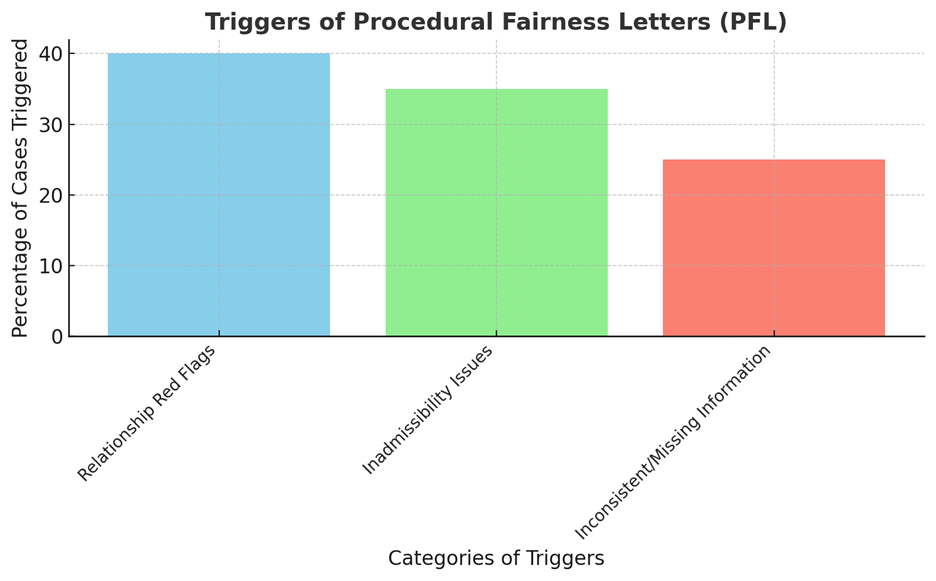
Additional Topics for Spousal Sponsorship: Procedural Fairness Letters
How to Prevent Receiving a Procedural Fairness Letter?
- Double-Check Everything: Ensure dates, timelines, and declarations are consistent across all forms and evidence.
- Provide Extra Documentation: Go beyond the minimum requirements. Include affidavits, photos with timestamps, and joint financial records upfront.
- Explain Potential Issues Proactively: If you foresee concerns (e.g., no wedding photos due to a private ceremony), address them in a cover letter with supporting evidence.
How to Respond Like a Pro
- Stay Calm, Act Fast: You’ll usually have 30 days to respond. Start gathering evidence immediately.
- Address Every Concern: If they’re questioning your relationship, provide additional proof—chat logs, videos, or joint financial statements.
- Write a Convincing Letter: Be respectful, detailed, and transparent. Explain the issues and how your evidence addresses them.
- Get Expert Help: A lawyer or immigration consultant can add polish and professionalism to your response.
Example: If IRCC doubts your relationship because you live apart, include travel receipts, screenshots of video calls, and affidavits from family and friends who can vouch for your connection.
Pro Tip: Organize your response with headings for each concern raised in the procedural fairness letter. Make it easy for IRCC to see how you’ve addressed everything.
What to Do After a Spousal Sponsorship Refusal
Getting a refusal can feel like the end of the road, but it’s important to remember that it’s not. You have several options to turn things around, and with the right strategy, you can still bring your loved one to Canada. Let’s break this down step by step.
Step 1: Understand the Reason for Refusal
Before jumping into action, you need to pinpoint why your application was refused. Carefully read the refusal letter provided by IRCC. This letter outlines the specific reasons for refusal, which often fall into these categories:
- Missing or Insufficient Documents:
- Common issues include missing police certificates, incomplete application forms, or insufficient proof of relationship.
- Example: If you submitted only a few photos without additional evidence like joint financial records, IRCC may view the relationship as lacking depth.
- Doubts About Relationship Authenticity:
- IRCC may feel your evidence doesn’t demonstrate a genuine relationship. Factors like a short dating period, lack of cohabitation, or minimal interaction can raise red flags.
- Admissibility Issues:
- Criminal records, medical concerns, or financial issues could make your spouse inadmissible to Canada.
- Example: If your spouse has a past conviction, IRCC might question their eligibility without rehabilitation proof.
- Inconsistent Information:
- Errors in timelines, conflicting details, or mismatched documents can lead to mistrust and rejection.
Pro Tip: Highlight and categorize the reasons mentioned in the refusal letter. This helps you prioritize your next steps effectively.
Step 2: Options After a Refusal
1. File an Appeal
- What It Is: An appeal allows you to challenge IRCC’s decision by presenting additional evidence or pointing out errors in their assessment.
- Where to File: Immigration Appeal Division (IAD).
- Timeline: You must file your appeal within 30 days of receiving the refusal notice.
- What Happens During the Appeal:
- A hearing is scheduled where you or your representative can present new evidence and argue your case.
- IRCC will provide their reasons for refusal, and you’ll have the opportunity to counter them.
Example:
If your application was refused due to insufficient proof of relationship, you could submit additional evidence such as:
- Photos from holidays, family gatherings, or daily life.
- Joint financial records (e.g., shared bank accounts or utility bills).
- Communication logs (emails, messages, or call records).
- Affidavits from family and friends attesting to the authenticity of your relationship.
Pro Tip: Appeals take time, often 6-12 months, so ensure you have enough evidence to make a compelling case.
2. Submit a New Application
If the refusal was due to easily fixable issues, such as missing documents or insufficient relationship evidence, submitting a new application may be faster than filing an appeal.
- What to Do Differently:
- Address every point mentioned in the refusal letter.
- Include additional evidence to bolster your case.
- Ensure all forms are complete, accurate, and consistent.
Example:
If your application was rejected due to incomplete timelines, resubmit with corrected information and a detailed cover letter explaining the changes.
3. Request a Judicial Review
If you believe the refusal was due to an error by IRCC or procedural unfairness, you can request a judicial review by the Federal Court.
- How It Works:
- The court reviews whether IRCC made an error in handling your application.
- This process focuses on procedural fairness rather than the merits of your case.
- Legal representation is required, as this is a complex and formal process.
Example:
If IRCC misinterpreted evidence, such as overlooking submitted documents, a judicial review could correct this oversight.
Step 3: Strengthen Your Case
Whether you choose to appeal, reapply, or seek a judicial review, strengthening your case is critical.
1. Add More Evidence
- Include comprehensive documentation that leaves no room for doubt.
- Examples:
- Photos from various life events (vacations, celebrations, casual outings).
- Financial proof, such as shared bank accounts or joint leases.
- Communication logs, including emails, chat histories, and call records.
2. Fix Past Mistakes
- Review your forms meticulously to avoid errors or inconsistencies.
- Ensure all dates, timelines, and supporting documents align perfectly.
3. Prepare a Strong Narrative
- Write a detailed letter explaining your relationship’s history, challenges, and future plans.
- Address any concerns raised in the refusal letter directly and honestly.
Pro Tip: Stay in Canada During the Process
If your spouse is already in Canada, they may be able to remain while you appeal or reapply. Use this time to gather more evidence and strengthen your application.
What to Do After a Spousal Sponsorship Refusal
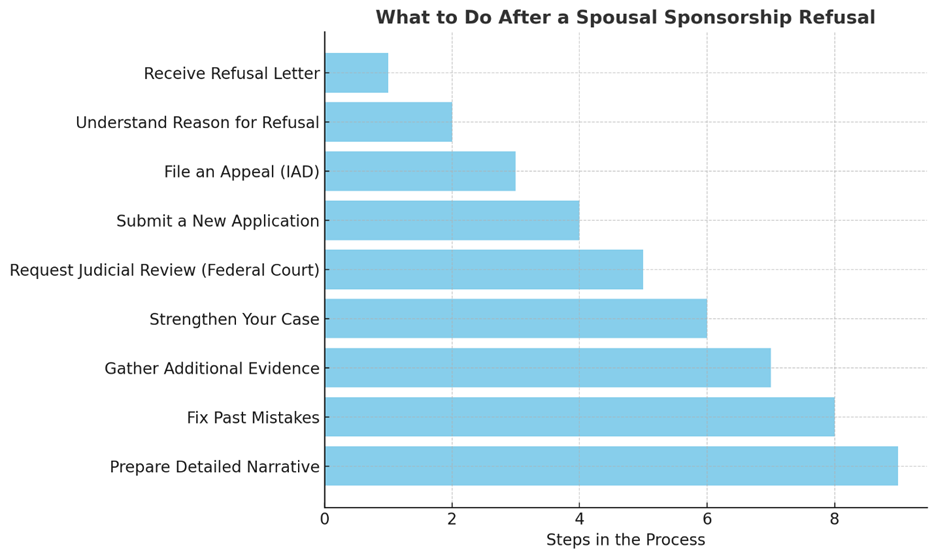
Spousal Sponsorship Refusal
Key Takeaway
A spousal sponsorship refusal is challenging, but it’s also an opportunity to present a stronger, more convincing case. By understanding the reasons for refusal and taking a strategic approach, you can overcome the setback and bring your loved one to Canada. If you feel overwhelmed, don’t hesitate to seek professional assistance—this process doesn’t have to be tackled alone!
Top of Form
Why Choose Akrami & Associates Immigration Law Firm for Your Spousal Sponsorship Needs?
Navigating the complexities of spousal sponsorship is no easy feat. From ensuring your application is bulletproof to tackling tricky situations like refusals or inadmissibility, having the right team by your side can make all the difference. That’s where Akrami & Associates comes in.
How We’ve Helped Thousands of Families with Spousal Sponsorship Applications
Navigating the intricacies of spousal sponsorship can feel overwhelming, but at Akrami & Associates, we specialize in turning challenges into success stories. With years of experience and a passion for reuniting families, we’ve helped thousands of clients achieve their dream of living together in Canada.
A Proven Track Record of Success
Over the years, Akrami & Associates has earned a reputation as a trusted partner in immigration. We’ve handled cases of every complexity—from straightforward applications to those involving inadmissibility due to criminal or medical concerns. Time and time again, we’ve demonstrated our ability to guide clients through the most daunting obstacles.
Take, for instance, the case of a client whose spousal sponsorship was refused due to insufficient evidence of their relationship. Our team helped them build a stronger case with detailed documentation, including travel receipts, shared financial records, and affidavits from family and friends. The result? A successful appeal and a joyful reunion in Canada.
Our commitment to excellence is reflected in the hundreds of glowing Google reviews from satisfied clients. People repeatedly praise our expertise, attention to detail, and dedication to their success.
What We Can Do for You
- Personalized Case Assessments
Every situation is unique. We take the time to understand your story, identify potential challenges, and create a custom strategy to maximize your chances of success.
Example: A client’s spousal sponsorship application was refused due to insufficient relationship evidence. Our team helped them gather stronger proof—photos, travel receipts, and affidavits—and successfully overturned the refusal on appeal.
- Expert Guidance Every Step of the Way
- We’ll handle the paperwork, ensuring your application is complete, consistent, and compelling.
- We’ll guide you on collecting the right documents, like police certificates and proof of cohabitation, to make your application IRCC-proof.
- Appeals and Refusals
Refused? Don’t worry, we’ve got you covered. Whether it’s an appeal to the Immigration Appeal Division or a judicial review, we’ll fight tirelessly to help you reunite with your spouse. - Overcoming Inadmissibility
- Criminal Record? We can guide you through Temporary Resident Permits (TRP) or Criminal Rehabilitation.
- Medical Concerns? We’ll help you present strong evidence to address IRCC’s concerns.
- Ongoing Support and Transparency
We keep you informed every step of the way with clear communication and regular updates.
Comprehensive and Personalized Support
At Akrami & Associates, we understand that no two cases are the same. That’s why we start every client relationship with a thorough assessment of their unique situation. Whether you’re applying inland or outland, dealing with procedural fairness letters, or reapplying after a refusal, we tailor our approach to meet your specific needs.
Our experienced team handles every aspect of the application process, from collecting and organizing documents to ensuring that every form is complete, consistent, and compelling. We also provide strategic advice to strengthen your case, such as how to present proof of your relationship or address any gaps in your timeline.
For clients facing challenges such as criminal inadmissibility, we offer solutions like Temporary Resident Permits (TRP) and Criminal Rehabilitation applications. Our goal is to eliminate obstacles and give you the best possible chance of success.
Fighting for Clients in Complex Situations
If your application has been refused, we’re here to help. Appeals and judicial reviews are part of our core expertise, and we’re prepared to fight tirelessly on your behalf. We carefully review refusal letters to identify weaknesses in the original application and craft a compelling case for the Immigration Appeal Division or Federal Court.
A Reputation for Excellence
Our work speaks for itself, but so do our clients. With hundreds of five-star reviews, Akrami & Associates has earned the trust and gratitude of families across Canada and around the world. One client wrote, “Akrami & Associates made what seemed like an impossible case a reality. Thank you for bringing my husband to Canada!” Another shared, “Their expertise and care turned a very stressful process into a manageable one.”
We don’t just process applications; we support families during some of the most important and emotional moments of their lives. That’s why so many clients recommend us to their friends and families.

Canadian Immigration Law Firm
Our Google Reviews Speak for Themselves
We’ve helped countless clients navigate the immigration system successfully, and they’ve shared their experiences online. Here’s what they’re saying:
- ⭐⭐⭐⭐⭐ “Akrami & Associates made what seemed like an impossible case a reality. Thank you for bringing my husband to Canada!”
- ⭐⭐⭐⭐⭐ “The team is incredibly knowledgeable and supportive. I felt cared for throughout the process.”
- ⭐⭐⭐⭐⭐ “They helped me appeal a refusal and win. I couldn’t have done it without them!”
Pro Tip: Search for “Akrami & Associates Spousal Sponsorship Reviews” on Google to read more success stories.
Why Trust Akrami & Associates?
- Proven Success: Hundreds of success stories with glowing reviews to back them up.
- Deep Expertise: 20+ years of experience in Canadian immigration law.
- Client-Centric Approach: We don’t just take on your case; we become your partner in achieving your goals.
Your Journey Starts Here
Let us take the stress out of your spousal sponsorship process. Whether you’re starting fresh, dealing with a refusal, or facing a challenging situation, we’ll stand by you every step of the way. Contact us today to schedule your consultation and take the first step toward reuniting with your loved one. When you choose Akrami & Associates, you’re not just hiring an immigration law firm—you’re gaining a partner dedicated to your success. We’re here to take the stress off your shoulders and guide you every step of the way. If you’re ready to start your spousal sponsorship journey or need help overcoming a challenge, contact us today. Let’s make your family’s dream a reality.
Still Confused about Spousal Sponsorship?
There are many other requirements as well. To be sure that you are moving on the right path, you must consult an immigration consultant. We have helped many people who wanted to immigrate to Canada under the spousal immigration program. We can help you too. All you need to do is make a call, and we can take it from there. We’ll arrange an appointment for you, and a dedicated representative will discuss your matter. This experienced person will stay by your side throughout the process and will keep you informed about your application status.
spousal sponsorship frequently asked questions (FAQs)
- Who is eligible to sponsor their spouse?
To sponsor your spouse, you must be a Canadian citizen, permanent resident, or registered under the Canadian Indian Act, at least 18 years old, and able to financially support your spouse without relying on social assistance. - Can I sponsor my spouse if I live outside Canada?
Yes, but only if you’re a Canadian citizen. You must provide proof of your intention to return to Canada once your spouse becomes a permanent resident. - Can a permanent resident sponsor their spouse while living outside Canada?
No. Permanent residents must reside in Canada to sponsor their spouse. - How long does the spousal sponsorship process take?
Processing times vary, but Inland applications typically take 12-18 months, while Outland applications take 9-12 months. - What’s the difference between Inland and Outland sponsorship?
- Inland: Your spouse is living in Canada; they may be eligible for an Open Work Permit.
- Outland: Your spouse lives outside Canada; the application is processed through their local visa office.
- Who is eligible to sponsor their spouse?
6.Can my spouse work in Canada while their application is being processed?
Yes, if they apply through Inland sponsorship and are granted an Open Work Permit.
- Do I need to prove income to sponsor my spouse?
No specific income threshold is required, but you must show you can financially support your spouse and not rely on social assistance. - What happens if my application is incomplete?
IRCC may return your application without processing. Ensure all forms are complete, signatures are included, and required documents are attached. - Can I sponsor my fiancé(e)?
No. You can only sponsor your spouse (legally married), common-law partner (cohabiting for 12+ months), or conjugal partner (unable to marry due to legal or cultural barriers). - What evidence do I need to prove my relationship?
Include marriage certificates, joint financial documents, photos, communication records, affidavits from family and friends, and shared travel itineraries. - Does my spouse need a medical exam?
Yes, your spouse must undergo a medical exam with an IRCC-approved panel physician to ensure they meet Canada’s health standards. - Do we need police certificates for spousal sponsorship?
Yes, your spouse must provide police certificates for all countries they’ve lived in for 6+ months since the age of 18. - What is the Right of Permanent Residence Fee?
This is a $515 fee paid as part of the spousal sponsorship application. It’s refunded if the application is denied. - Can I sponsor my spouse if I’ve previously sponsored someone else?
You must wait 5 years after sponsoring a previous spouse, common-law partner, or conjugal partner before sponsoring someone new. - What happens if IRCC doubts the authenticity of our relationship?
IRCC may request additional evidence or conduct an interview to verify your relationship. Be prepared to provide detailed documentation. - What if my spouse is inadmissible due to a criminal record?
They can apply for a Temporary Resident Permit (TRP) for temporary entry or Criminal Rehabilitation for permanent resolution. - Can I sponsor my spouse if I’m unemployed?
Yes, as long as you demonstrate your ability to meet basic financial needs without relying on social assistance. - What if my spouse has dependent children?
Dependent children can be included in the application, but you’ll need to provide additional documents like birth certificates and custody papers if applicable. - Can I withdraw my sponsorship application?
Yes, you can withdraw your sponsorship at any time before the final decision. However, fees already paid may not be refunded. - What happens after the application is approved?
Your spouse will receive Confirmation of Permanent Residence (COPR) and can move to or remain in Canada as a permanent resident. Inland applicants receive their PR card shortly after. - How much does it cost to sponsor my spouse?
- Sponsorship fee: $75
- Principal applicant processing fee: $490
- Right of Permanent Residence Fee: $515
- Biometrics: $85
- Can my spouse work while waiting for PR?
- Yes, if applying through Inland Sponsorship and an Open Work Permit is issued.
- What if IRCC doubts our relationship?
- Provide additional proof, such as affidavits or more communication logs.
We can Help You With your Spousal Sponsorship Application!

We have dealt with hundreds of Spousal Sponsorship application cases. We have helped our clients in their difficult situations and have guided them to draft a more effective applications. We can help you draft your application and arrange the required documents. A well-planned and complete application will increase your likelihood of acceptance and will save you from hassle.
If you are worried about the legal fees, don’t be! Our goal is to help everyone that is interested in immigrating to Canada. Contact us, and we can provide numerous options for you. You can also purchase our very affordable Do it Yourself Immigration Kit, which details everything for you. If you are still not sure, feel free to get back to us. We will review your case before you submit it to give you the best possible outcome.
Many changes have been made to the sponsorship applications to reduce processing times and have family members reunited faster. As simplified as the process has been made, it is still recommended to hire an immigration expert to assist you with the application process. Many clients still tend to make errors on their application that could potentially harm the decision on their application.
To avoid delays or refusals on your application, contact Akrami & Associates for the best possible outcome. Akrami & Associates has submitted many successful sponsorship applications, and we can help you too! Contact us today at 416-477-2545 to get your application started today.
More Related Content
Call us for
more Information
+1-416-477-2545
Toll Free: 1-877-820-7121
Call us today
Write Us (Online Form)
Complete our form and one of our
Representatives will contact you.
Immigration inquiries

Call us for
more Information
+1-416-477-2545
Toll Free: 1-877-820-7121
Call us today

Write Us (Online Form)
Complete our form and one of our
Representatives will contact you.
Immigration inquiries
Subscribe To Our Newsletter


